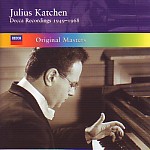Here’s a generously packed, excellently remastered eight-disc overview of Julius Katchen’s prolific (though tragically short-lived) recording career. Much of the material overlaps with Australian Decca’s 16-disc series The Art of Julius Katchen and two double albums issued in Philips’ deleted Great Pianists of the Twentieth Century series. On the other hand, a few rarities new to CD (so far as I know) may entice Katchen mavens to swallow the cost of duplicating what they may already own. I specifically refer to Katchen’s 1953 Beethoven Diabelli Variations and 1955 Op. 111 Sonata.
If the pianist’s 1960 stereo Diabelli remake makes a compelling if glib case for this monumental opus as an unbridled, virtuoso vehicle (I jokingly call it the “Oscar Peterson” Diabellis), the mono version benefits from less hectic fast tempos and more seamless, natural transitions between sections. Still, I miss the sharper accents, more pronounced dynamic contrasts, profounder slow variations, and greater overall kinetic thrust characterizing other 1950s Diabelli sets from Arrau, Serkin, Horszowski, and the obscure but reissue-worthy Paul Baumgartner. Katchen’s mono Op. 111 boasts greater cohesion and tighter tempo relationships than his older label mate Wilhelm Backhaus, but his 1968 remake is cleaner in detail and more searchingly inflected.
Listeners who admire the lyricism and poetry distinguishing Katchen’s benchmark Brahms violin sonata collaborations with Josef Suk will find his mono encounters with Ruggiero Ricci in the Second and Third more overtly virtuosic. And speaking of bravura, Katchen’s no-holds-barred Gershwin Rhapsody in Blue is great fun. At long last we have the superior stereo remake with István Kertész and the London Symphony Orchestra, as opposed to the previously reissued mono edition bogged down by Mantovani’s oleaginous orchestra.
I wish the Katchen/Kertész absolute smoker of a Prokofiev Third and high-wire Ravel concertos had been complemented by the pair’s equally sharp-edged Bartók Third instead of the pianist’s sedate and inferior mono traversal with Ansermet. Nor do the mono Rachmaninov Paganini Rhapsody and Dohnányi Nursery Rhyme Variations with Adrian Boult hold significant advantage over the pair’s stereo remakes.
If you search Classicstoday.com’s review digest, you’ll be able to access my detailed comments concerning Katchen’s Schumann, Chopin, and Schubert, along with Eloquence’s release of the rare 1958 Brahms Paganini and Handel Variation sets. But I must mention the pianist’s 1949 Brahms F minor sonata. The young pianist goes at the music like a horse with blinders on, fueled by cocky virtuosity and red-blooded temperament. In spades. This, folks, is nothing if not big piano playing, and the interpretation generally is more direct than Katchen’s more familiar stereo Brahms F minor. Jeremy Hayes’ booklet notes provide an enthusiastic yet fairly balanced assessment of this collection’s contents.
































